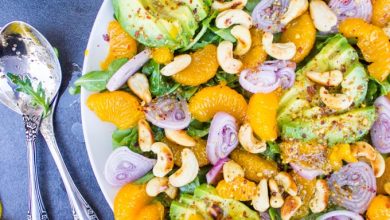African Couscous Salad is a delightful dish that combines the flavors and ingredients commonly found in African cuisine. It’s a colorful and flavorful salad that can be served as a side dish or even a main course. Let’s dive into the details you requested:
What is African Couscous Salad?
African Couscous Salad is a fusion of North African and Mediterranean influences. It typically consists of cooked couscous, a grain made from crushed wheat, mixed with a variety of fresh vegetables, herbs, and sometimes fruits. The salad is dressed with a zesty and aromatic vinaigrette, often featuring citrus flavors.
History:
Couscous itself has a long history in North Africa and the Middle East, dating back centuries. It’s a staple in many North African cuisines, including Moroccan, Algerian, and Tunisian. The exact origin of African Couscous Salad is harder to pinpoint, but it likely emerged as a modern interpretation of traditional couscous dishes, influenced by Western culinary trends.
Components:
The components of African Couscous Salad can vary, but here are some common ingredients:
- Couscous: The base of the salad, cooked and fluffed to perfection.
- Vegetables: This can include diced cucumbers, bell peppers, tomatoes, red onions, and sometimes carrots.
- Herbs: Fresh herbs like mint, cilantro, and parsley add a burst of flavor.
- Fruits: Some variations include dried fruits like raisins or apricots for a touch of sweetness.
- Nuts: Toasted almonds or pine nuts are often used for crunch and depth of flavor.
- Dressing: A tangy dressing made with olive oil, lemon juice, vinegar, garlic, and spices like cumin and coriander.
Steps to Prepare African Couscous Salad:
Here’s a basic recipe for African Couscous Salad:
- Prepare the Couscous: Cook couscous according to package instructions. Fluff it with a fork and let it cool.
- Chop Vegetables: Dice cucumbers, bell peppers, tomatoes, and red onions. If you’re using carrots, grate them.
- Chop Herbs: Finely chop fresh mint, cilantro, and parsley.
- Make Dressing: In a bowl, whisk together olive oil, lemon juice, vinegar, minced garlic, cumin, coriander, salt, and pepper.
- Combine Ingredients: In a large mixing bowl, combine the cooked couscous, chopped vegetables, herbs, and any optional ingredients like dried fruits or nuts.
- Dress the Salad: Pour the dressing over the salad and toss everything together until well coated.
- Chill and Serve: Refrigerate the salad for at least an hour to let the flavors meld. Serve chilled.
Preparation Time:
The preparation time for African Couscous Salad varies but generally takes about 20-30 minutes for chopping and mixing ingredients. The cooking time for couscous itself is usually around 10 minutes. Additionally, you’ll need to allow time for the salad to chill in the refrigerator, which can be anywhere from 1 to 2 hours.
Enjoy your African Couscous Salad, a vibrant and flavorful dish that’s perfect for any occasion!
African Couscous Salad is a delicious and nutritious dish. Here are some general nutrition facts and health information for this recipe:
Nutrition Facts (Approximate Values per Serving):
- Calories: 300-400 kcal
- Carbohydrates: 55-65 grams
- Protein: 8-10 grams
- Fat: 8-12 grams
- Fiber: 6-8 grams
- Sugars: 5-8 grams
- Vitamins and Minerals: The salad is rich in vitamins like vitamin C (from vegetables), vitamin K (from herbs), and minerals such as potassium and magnesium.
Health Information:
-
Low in Saturated Fat: African Couscous Salad is typically low in saturated fat, which is beneficial for heart health.
-
Rich in Fiber: The salad contains a good amount of dietary fiber, which aids digestion and helps maintain a feeling of fullness, potentially assisting with weight management.
-
Abundance of Vegetables: The variety of vegetables in the salad provides essential vitamins, minerals, and antioxidants that support overall health and immunity.
-
Herb Benefits: Fresh herbs like mint, cilantro, and parsley not only enhance flavor but also offer antioxidants and potential anti-inflammatory properties.
-
Whole Grain Couscous: If you use whole grain couscous, it adds extra fiber and nutrients compared to regular couscous, contributing to better blood sugar control and digestive health.
-
Balanced Ingredients: The balance of carbohydrates, protein, and healthy fats in this salad can make it a satisfying and balanced meal.
-
Customization: You can customize the salad to fit your dietary preferences. For example, you can reduce the amount of added sugar by using less dried fruit or omitting it altogether.
Remember that the exact nutritional content may vary based on specific ingredients and portion sizes used in your recipe. If you have specific dietary concerns or requirements, it’s advisable to calculate the nutrition facts using a nutrition calculator or consult with a registered dietitian for personalized guidance.



